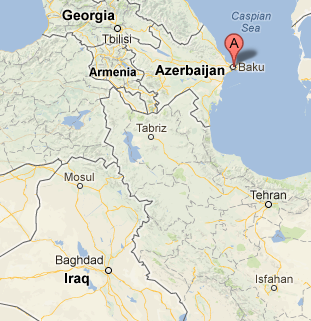
by Larry Magid
(Baku, Azerbaijan) I arrived in this former Soviet republic on Saturday night ahead of the Internet Governance Forum (IGF) that gets underway on Tuesday.
The IGF is a United Nations sponsored “multi-stakeholder” forum to discuss a wide variety of issues regarding Internet governance. Unlike many U.N. forums, IGF is attended not just by government officials but also by corporations, non-profit groups (aka “NGOs” or “non-governmental organizations) and scholars interested in how to handle, security, stability, growth and content management on the global Internet.

IGF isn’t a legislative body — it’s a place to talk about Internet issues and serve as a backdrop to policy makers around the world who are struggling on how to “manage” the fact that we now live in a world that is “virtually” without borders.
Passing virtual customs
When I entered Azerbaijan, I had to pass through immigration, which had the right to inspect what I was bringing into the country. But as I sit here in my hotel in the old city of Baku, data is flowing instantly between my laptop and colleagues around the world, without passing a single customs’ official. And in some cases that information can be more powerful than any potential weapon someone might smuggle, while virtual goods can have greater value than physical good people might carry in their suitcase. Having said that, I’m not naive enough to rule-out the possibility that some government is looking over my virtual shoulder.
Virtual law enforcement
In its review of my visa application, I’m quite sure that the Azerbaijani officials made sure I’m not a terrorist or a convicted child molestar or smuggler, but that’s not so easy when it comes to those who travel here via cyberspace.
Part of the job of IGF is to look at how countries can “police” the Internet against a wide variety of crimes including child pornography, money laundering, copyright infringement, spam and, of course, scams designed to separate people from their money. Sessions will focus on technological, legal and social ways to combat crime as well as how individuals can protect themselves from Internet scams.
I’ll be attending sessions on child pornography (otherwise known as child abuse images) that is illegal in most but not all countries. The goal is to foster international cooperation between law enforcement and child protection organizations such as the National Center for Missing and Exploited Children in the United States (who’s board I serve on), the Internet Watch Foundation in the United Kingdom and representatives of Interpol, the FBI and other law enforcement agencies.
Social policy
I’m here to participate in several panels related to child protection online, but my primary role — and that of several other speakers including my ConnectSafely co-director Anne Collier, will be to look at the social milieu of youth use of the Internet and technology. Many of the issues that young people face online have nothing to do with crime. If a child is being harassed online or winds up posting something embarrassing, the police aren’t going to help her as much as her peers including both and online and offline friends along with parents and other caring adults her life. If a child gets “in trouble” for something they do wrong online — be it bullying, playful hacking, looking at porn or illegally downloading copyrighted material — the best responses rarely come from the legal system but from peer pressure, parental involvement or a firm but loving intervention by educators and other adults. And — most important — if a child is denied unfettered access to the Internet, the solution lies not with law enforcement but with a national and local commitment to ensure access so that all children can truly become fully empowered citizens of the online global village.
Rights of the child
I’ll be moderating a panel organized by the European Alliance for Child Safety Online (eNACSO) entitled, The UN convention on the Rights of the Child – is it fit for purpose in the digital age? The 1989 Convention, which has been ratified by every country except the United States and Somalia, protects children from involvement of children in armed conflict and addresses issues such as the sale of children, child prostitution and child pornography. But it also deals with speech rights. Article 21 of the convention states, “The child shall have the right to freedom of expression; this right shall include freedom to seek, receive and impart information and ideas of all kinds, regardless of frontiers, either orally, in writing or in print, in the form of art, or through any other media of the child’s choice.”
That right guarantees children’s freedom to access all media (obviously including the Internet) and, as I interpret it, protects them from arbitrary censorship whether imposed by government, school officials or their own parents. I’ll have more on this in an upcoming post later this week.